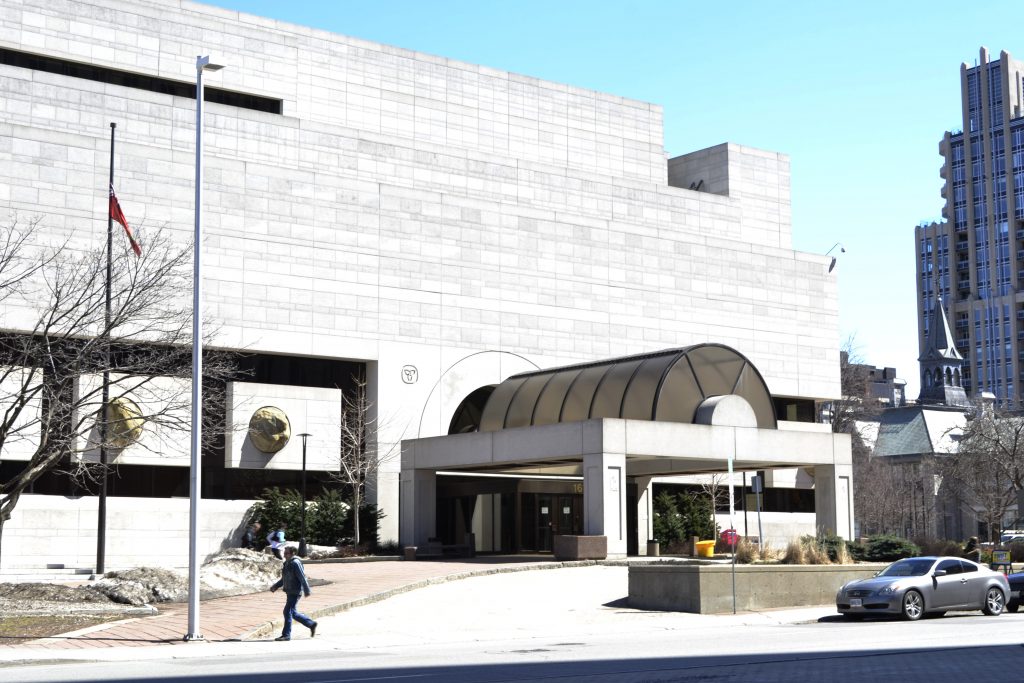Naqvi calls for ‘bold’ legal reform
By Rachel Jaskula
Limiting the number of preliminary hearings could be one way to keep court cases in Ottawa and across the province from dragging on for years, says Ottawa Centre MPP Yasir Naqvi, who is also Ontario’s attorney general.
But what Naqvi calls a “bold reform” in the legal system is described by critics as skipping a crucial step in the judicial process.
The issue arises just as the country’s justice ministers plan to meet in Gatineau on April 28 to discuss the crisis gripping Canada’s legal system. Excessive court delays have caused cases to be quashed and raised hard questions about the management of courtrooms in Ontario and other provinces.
Ottawa’s provincial courthouse on Elgin Street became a flashpoint in the court backlog controversy late last year when two high-profile cases — one involving a charge of first-degree murder — were thrown out by the presiding judges because they had taken too long to come to court.
Naqvi recently suggested that limiting preliminary inquiries is probably the best way to comply with a Supreme Court decision to speed up court procedure.
“We have to really take the call of action from the Supreme Court and one of the things they talk about is how in the entire system there’s a culture of complacency,” he said.
On Feb. 21, Naqvi sent a letter to Justice Minister Jody Wilson-Raybould asking the federal government to limit the number of cases that have a preliminary hearing in the criminal court system.
The proposal stemmed from the Supreme Court’s decision in 2016 to limit criminal trials to a total of 30 months in length.
Naqvi said the court system needs to be more efficient and the it has to ensure that “there are no unreasonable delays and the fundamental right of the accused under the Charter is protected.”
At the Ottawa courthouse, more than 20 per cent of criminal cases have been in the judicial system for 15 months or more, which brings them close to their 30-month limit, according to the Ontario Court of Justice Criminal Modernization committee data.
If preliminary hearings were drastically limited in the court system, most cases would move straight to plea negotiations, meaning the case would automatically go to trial.
The opportunity for a judge to decide whether or not there is enough evidence to continue with the case during a preliminary inquiry would be eliminated for most cases.
Some lawyers are saying that preliminary inquiries are pertinent to the court system because crucial information can be discovered during this stage that can be useful later on.
“A preliminary inquiry acts as a procedure that enables the defence to fully investigate the crown’s case and because often what you get on paper is a lot different than when a person’s in the witness box,” said James Harbic, an Ottawa defence lawyer.
Rebecca Bromwich, law professor at Carleton University, said limiting preliminary inquiries in the court system might not be the most beneficial way to speed up trials. “Most matters don’t go to preliminary inquiry anyway…this is only a small number of proceedings that would eliminate a procedural step.”
In 2014-2015, only about three per cent of completed adult criminal cases had a preliminary hearing, according to Statistics Canada.
Naqvi made it clear that he does not want preliminary hearings to be eliminated from the court system – just reduced for less serious cases.
“For cases dealing with murder it is suggested that one maintains preliminary inquiries because these are very serious charges against any individual, and if proven guilty they come with very significant consequences,” Naqvi said.
Bromwich said a lot of individuals working in the court system say preliminary inquiries can make the trial process faster, “because at the preliminary inquiry the Crown and defense can see the evidence, test the evidence and it is not unusual for a matter to go to an agreement on plea after the evidence has been seen.”
Experts such as Bromwich agree that bold reform needs to happen in the court system. “We certainly have overburdened courts and we have too many delays in the criminal justice system. It does take too long for matters to get to trial.”

